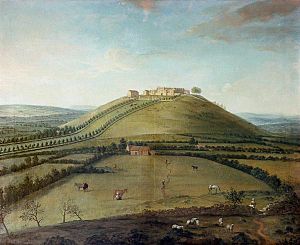Sir Henry Hoghton, 5th Baronet facts for kids
Sir Henry Hoghton, 5th Baronet (born around 1678, died 1768) was an important British politician. He lived at Hoghton Tower in Lancashire, England. Sir Henry was a member of the House of Commons, which is like one part of the British Parliament, between 1710 and 1741. He had very strong religious beliefs that were different from the main church at the time. These beliefs made him strongly oppose the Jacobite rebellions, which were attempts to bring back the old royal family to the throne.
Sir Henry was the second son of Sir Charles Hoghton, 4th Baronet. A Baronet is a special title, like a knight, that can be passed down in a family. His mother was Mary Skeffington. His family had a long history of being "non-conformists," meaning they didn't follow the official Church of England. Sir Henry continued this tradition and even helped start many non-conformist churches. In 1695, he began studying law. When his father died in 1710, Henry became the 5th Baronet and took over the family estates.
Contents
Early Life and Political Start
Sir Henry became a "Freeman" of Preston in 1682. This meant he had special rights in the town. In 1710, he also became a "burgess" of Wigan, which was a similar role. He was a Deputy Lieutenant for Lancashire, helping to manage the county, and a Colonel in the local army, called the militia.
In the 1710 general election, Sir Henry was chosen as a Member of Parliament (MP) for Preston. He was a member of the Whig party, which was one of the main political groups at the time. However, he lost his seat in the 1713 election. He was then elected again for Preston without anyone opposing him in the 1715 election.
Role in Rebellions and Later Politics
During the Jacobite rebellion of 1715, Sir Henry was very busy helping to defend Lancashire. His own house in Preston was used by both sides during the fighting. After the rebellion, in 1716, he was made one of the Commissioners for "forfeited estates." This meant he helped manage the land and property taken from people who had rebelled against the government.
In the 1722 election, he tried to become an MP for Lancashire but didn't win. After another try in 1724, the government helped him become an MP for East Looe in a special election. He was then elected again for Preston without opposition in both 1727 and 1734. In 1734, he was given an important job by the Prime Minister, Robert Walpole, as a "judge-advocate-general." This role involved legal matters for the army. He lost his seat in the 1741 election and then left his job.
When another Jacobite rebellion happened in 1745, Sir Henry was ready to defend his county. However, he didn't have enough resources and had to go to Yorkshire for safety. After this rebellion, as a local judge, he was very strict with Roman Catholics. The government thought he was too harsh, overturned his decisions, and even threatened to remove him from his position.
Family and Legacy
Sir Henry Hoghton passed away on February 23, 1768, when he was 91 years old. He was married three times.
- His first wife was Mary Boughton, whom he married in 1710. She died in 1720.
- His second wife was Lady Elizabeth Russell, whom he married in 1721. She died in 1736.
- His third wife was Susanna Butterworth, whom he married after 1736.
Sir Henry did not have any children from his marriages. Because of this, his title of Baronet and his estates were passed on to his nephew, who was also named Henry.
Images for kids
 | Emma Amos |
 | Edward Mitchell Bannister |
 | Larry D. Alexander |
 | Ernie Barnes |



